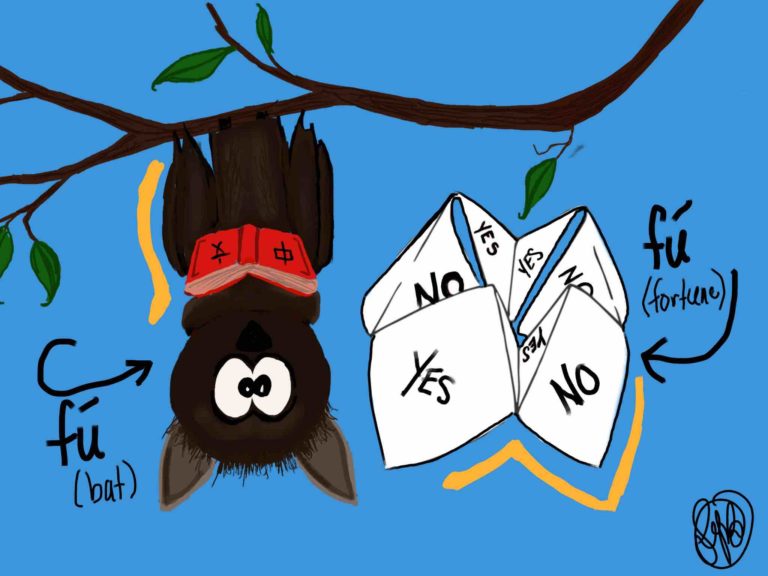Cover photo by Safa Bilal
There are only so many syllables and tones in the Mandarin language. This makes Mandarin rife with homophones—words that sound the same but with separate meanings. Mandarin homophones make for some interesting cultural beliefs and traditions. Here is a list of eight homophones you may not be familiar with.
-
1 蝠 (fú) vs. 福 (fú)

蝠 (fu), the Mandarin word for bat, is pronounced the same as 福 (fu), a word for good fortune or happiness. Thus the bat became a symbol for happiness, and bats are featured prominently in many ancient Chinese paintings as well as in modern artwork.
-
2 福到了 (fú dào le) vs. 福倒了(fú dǎo le)

福 is also a common word found on holiday decorations, especially those for the Lunar New Year. It is customary to hang decorations with 福 displayed upside down, because saying that 福 is upside down‒福倒了(fu dao le)‒sounds like 福到了(fu dao le), meaning good fortune has arrived.
-
3 年年有余 (nián nián yǒu yú) vs. 年年有鱼 (nián nián yǒu yú)

Another common New Year’s phrase is 年年有余 (nian nian you yu), roughly “may the new year have surplus.” 余 is a homophone with the word for fish, 鱼 (yu). Therefore, many New Year’s decorations also include pictures of fish and households traditionally eat fish as part of their New Year’s meal.
-
4 四 (sì) vs. 死 (sǐ) and 八 (bā) vs. 发 (fā)
The number four, 四 (si), is unlucky in Chinese culture because it is homonymous with 死 (si), the word for death. Hospitals, hotels, and apartment buildings will sometimes skip the fourth floor and instead number it as the fifth to avoid this unlucky number.
On the other hand eight is an extremely lucky number because 八 (ba) sounds similar to 发 (fa), a word meaning prosperity. Businesses favor numbers with as many eights as possible, and the 2008 Beijing Olympics began their opening ceremony at 8 p.m. on August 8.
-
5 平安 (píng ān) vs. 瓶案 (píng àn)

When moving in to a new house, people in some parts of China like to first put a vase on the table. Putting together the words 瓶 (ping) and 案 (an), vase and table respectively, sounds like 平安 (ping an), which means safe and at peace. Therefore, placing a vase on a table ensures that the new house will be a safe and peaceful place to live in.
-
6 送钟 (sòng zhōng) vs. 送终 (sòng zhōng)

In Chinese culture, it is considered rude to give someone a clock as a gift. 送钟 (song zhong), to give a clock, sounds like 送终 (song zhong), which means to go to a funeral or literally “bury a parent.” Receiving clock as a gift would mean that the sender is counting down the seconds until your death. So avoid giving someone a watch as a gift, especially an older relative.
-
7 伞 (sǎn) vs. 散 (sàn)

Another gift to avoid is giving an umbrella to your significant other. The Mandarin word for umbrella 伞 (san) is a homophone with the word 散 (san) meaning “to break up.” An umbrella as a gift could make it seem like you want to break up. You don’t want to send the wrong signals!
-
8 88 (bā bā) vs. 拜拜 (bài bài)
In texting lingo, 88 has become a common way to say goodbye. Two eights, pronounced ba ba, sounds like bai bai (拜拜). This in turn sounds like bye-bye, adapted from the English meaning goodbye. 88!



0 Comments